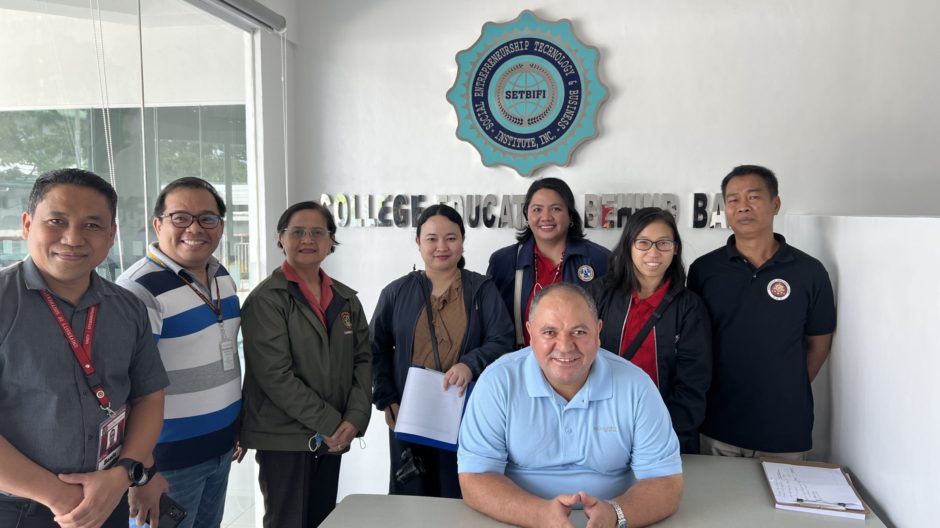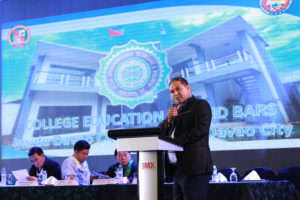
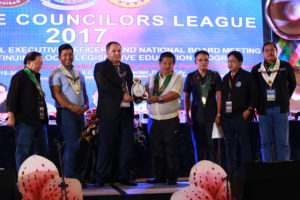
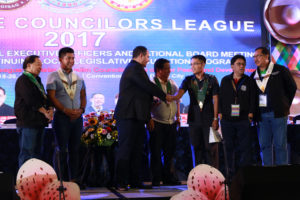
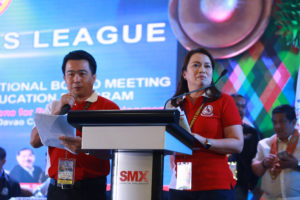 The president of the Social Entrepreneurship Institute, Dr. Aland Mizell, told several thousand councilors attending the Philippines 3rd Quarterly National Executive Officers-National Board (NEO-NB) Meeting and 2nd
The president of the Social Entrepreneurship Institute, Dr. Aland Mizell, told several thousand councilors attending the Philippines 3rd Quarterly National Executive Officers-National Board (NEO-NB) Meeting and 2nd 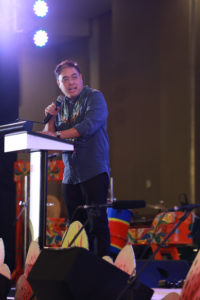
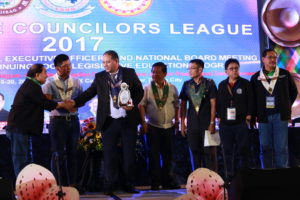 Series of Continuing Local Legislative Education Program (CLLEP) of the Philippine Councilors League that it is an undeniable fact that we live in a society where people do bad things, sometimes so bad that being to sent to prison is the only option. The event was held at the SMX Convention Center, SM Lanang Premier, Davao City on Monday, September 18, 2017. Dr. Mizell added that it is also an undeniable fact that most of the inmates inside the jail today will not be in forever, and sooner or later they will be free to go back into society. The question is will their re-entry be a one-way trip? Will each of them leave the jail never to return? To follow that route, inmates must know how to succeed when they re-enter society. Statistics are stacked against them. When prisoners get out, eventually, most of them find themselves back in. There are many reasons for the recidivism, but studies consistently show that the primary cause is unemployment. On the outside they need a job to eat, a place to live, skills to support their family, and the ability to hold their head high and know they can handle the freedom. But jobs are hard to find when they carry a prison record with them. Still, they cannot use that as an excuse. With solid training and a recovery program to transform lives, released prisoners can overcome a prison record and the stigma. Dr. Mizell concluded that we still have more work to do. We need to initiate College Education Behind Bars in every jail in the Philippines. The more this programs is reproduced in other jails, the less money the jails have to spend. In the future, we need to prepare as many inmates as possible to return to society as productive, law abiding citizens. Some city councilors indicated an interest in replicating the program in their cities as well.
Series of Continuing Local Legislative Education Program (CLLEP) of the Philippine Councilors League that it is an undeniable fact that we live in a society where people do bad things, sometimes so bad that being to sent to prison is the only option. The event was held at the SMX Convention Center, SM Lanang Premier, Davao City on Monday, September 18, 2017. Dr. Mizell added that it is also an undeniable fact that most of the inmates inside the jail today will not be in forever, and sooner or later they will be free to go back into society. The question is will their re-entry be a one-way trip? Will each of them leave the jail never to return? To follow that route, inmates must know how to succeed when they re-enter society. Statistics are stacked against them. When prisoners get out, eventually, most of them find themselves back in. There are many reasons for the recidivism, but studies consistently show that the primary cause is unemployment. On the outside they need a job to eat, a place to live, skills to support their family, and the ability to hold their head high and know they can handle the freedom. But jobs are hard to find when they carry a prison record with them. Still, they cannot use that as an excuse. With solid training and a recovery program to transform lives, released prisoners can overcome a prison record and the stigma. Dr. Mizell concluded that we still have more work to do. We need to initiate College Education Behind Bars in every jail in the Philippines. The more this programs is reproduced in other jails, the less money the jails have to spend. In the future, we need to prepare as many inmates as possible to return to society as productive, law abiding citizens. Some city councilors indicated an interest in replicating the program in their cities as well.
This initiative serves as a nationwide model, having received national attention as the only such program combining education and rehabilitation for prisoners/students in the Philippines and indeed in Southeast Asia. Dr. Mizell was honored for his work as an educator, for his role in founding this innovative program on behalf of the incarcerated, and for his effort to show that learning has the power to change lives. The award was presented during the PCL 3rd quarter meeting. Dr. Mizell’s being selected to receive this award highlights MCI‘s strong commitment to community service and to providing bright and motivated students with opportunities to experience the transformational power of higher education and a recovery program. During the ceremony PCL National Chairman and Davao City Councilor Dr. Danny Dayanghirang thanked Dr. Mizell for his noble work on behalf of the Davao City community and the Philippines.
Councilor Dayanghirang said that the rehabilitation programs of the BJMP lead to the reformation of the detainees and help them to become law-abiding and productive members of society once again. Several other city councilors thanked Dr. Mizell for implementing this model rehabilitation program. Dr. Dayanghirang said that increased educational opportunity is key to providing economic stability for both ex-offenders and their families, to reducing recidivism, and to securing long-term success after their release. Dr. Mizell acknowledged that a college degree tears down barriers that block gainful employment and also keeps men and women from returning to prison, although many outsiders fail to recognize this potential.
The Philippine Councilors League PCL is the organization of all city and municipal council members of the Republic of the Philippines that was formally established in 1990 and created by authority of law--the Philippines Local Government Code. Among its primary objective is the establishment of a nationwide forum on local autonomy and decentralization of power.
The Social Entrepreneurship Institute as an Initiative of Minority Care International
Established in 2015, the Social Entrepreneurship Institute is an educational enterprise of Minority Care International (MCI), a non-profit educational and economic development organization serving Davao City. For nearly a decade MCI has focused on providing scholarships for underprivileged students to attend and complete college as well as train them in their careers. In an international exchange program, MCI has partnered with a renowned Texas university and simultaneously provided internships in the U.S.
Further, MCI community service-learning projects have given backpacks with school supplies to students in impoverished communities, provided free eyeglasses distribution to the indigent, and offered health clinics and educational projects to the needy. Since 2008, MCI has held weekly forums for students to hear experts in their field such as attorneys, city officials, the mayor, professors, doctors, religious teachers, businessmen and women, and public service staff and to debate key issues affecting their community, the city, the nation, and the world. An inner-community boys’ soccer team and a girls’ volleyball team provide alternatives to the social ills growing out of poverty.
In addition, MCI has partnered with several local universities to bring speakers from the United States to Davao, including professors, bankers, government representatives, and business professionals, setting up educational seminars for the university faculty and students and for city leaders. MCI students also have won an award for the Rotaract Club’s service-learning project. As a more recent educational endeavor, MCI has contracted with the Philippine Department of Education and Thompson Christian School for MCI’s education majors to tutor in an Alternative Delivery Program (ADM) for high school dropouts and at-risk students, offering mentoring, sessions on study skills, and content assistance on a regular schedule. For this project, MCI won a Department of Education award. MCI partners with U.S. institutions such as Texas A&M University of Commerce, Hunt County Medical Center, Boles Independent School District, and some business establishments in Texas as well as the University of the Mindanao and the University of the Southeastern Philippines in Davao.
The Social Entrepreneurship Institute Initiates College Behind Bars Program
In 2016, to implement a college education and a step rehabilitation program in the city jail, Dr. Mizell founded the College Education Behind Bars with the backing of Attorney Susan Cariaga. SEI President Aland Mizell and Vice-President Susan Cariaga partnered with the University of Southern Philippines (USEP) under the capable and creative leadership of its President, Dr. Lourdes Generalao. Inmate students enroll in USEP and complete college courses taught by USEP faculty. When they graduate, they will receive a diplomat from USEP.
The Social Entrepreneurship Institute (SEI) funded this initiative, designed the facility, furnished the classrooms, and set up the programming at the Ma-a Jail in Davao. This is the initial pilot in the Philippines, which SEI anticipates implementing across the Philippines.
